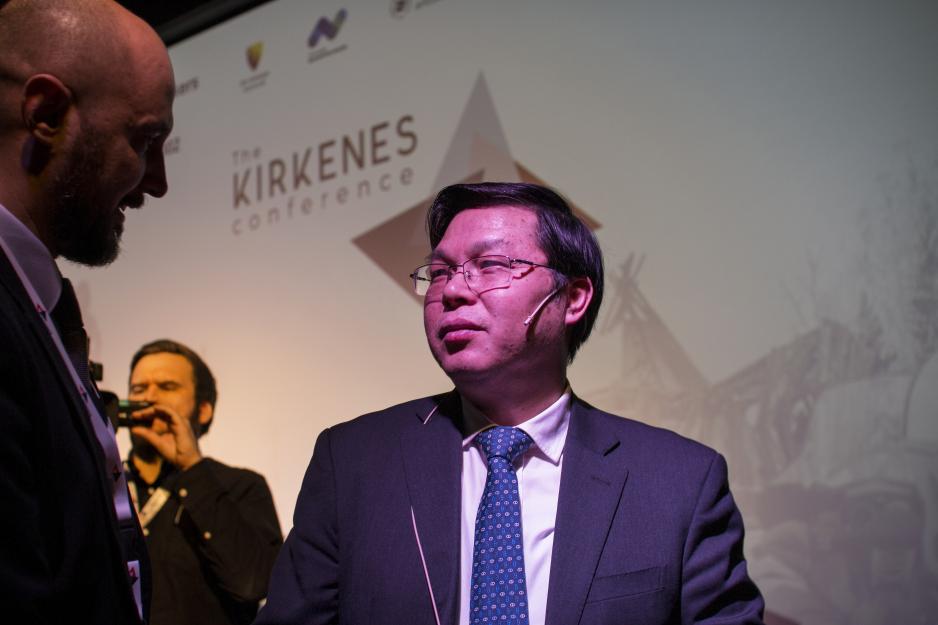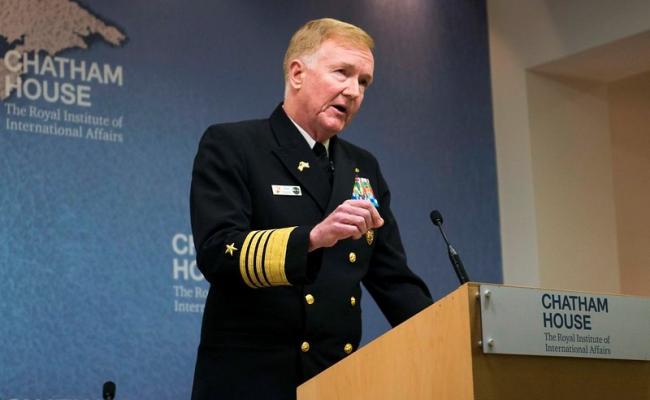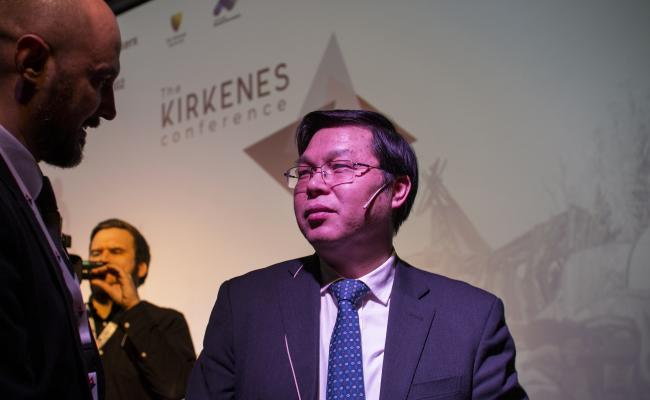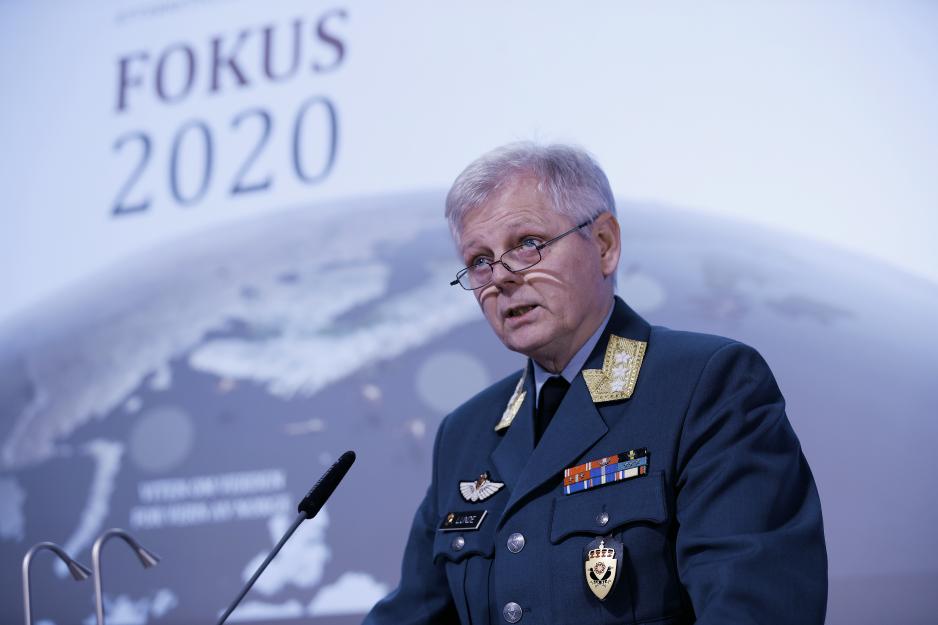China's Ambassador: “Threat has been a must-be word for some US officials when they talk about China”

China's Ambassador to Norway, Yi Xianliang, during the Kirkenes conference in 2020. Photo: Amund Trellevik.
“The question of whether the commercial cooperation between China and Norway, Russia and other Arctic countries constitutes a security-related issue should be answered by the countries themselves, not the US,” China's Ambassador to Norway Yi Xianliang tells High North News.
Last month, U.S. State Department officials warned against Chinese and Russian attempts to challenge US and western allies’ interests in the High North.
U.S. officials cautioned amongst others against national security implications of Chinese investments in the region, as well as against increased Chinese activity off the coast of Norway in the High North.
The statements on Chinese and Russian activities in the Arctic region follow a pattern of concerns issued over the past few years. In its most recent Arctic Strategy, the US Department of Defense paints a picture of the region as a potential corridor for strategic engagement and competition between great powers.
High North News has extensively covered reactions from politicians and researchers to the concerns issued by US representatives.
In a response to the US officials' statements, Chinese Ambassador to Norway Yi Xianliang tells High North News in an e-mail that “for some time, “threat” has been a “must-be” word for some US officials when they talk about China, from military, trade, 5G and now to the Arctic - you name it.”
In 2018, the Chinese government issued a White Paper on China’s Arctic Policy. Ambassador Xianliang says the White Paper reiterates that China will contribute to peace, stability and sustainable development in the Arctic on the basis of the principles of “respect, cooperation, win-win result and sustainability.”
Also read
Competing views
In his confirmation hearing to become US Secretary of the Navy, former US Ambassador to Norway Kenneth J. Braithwaite spoke about extensive Chinese activities off the coast of Norway in the High North.
“You would be alarmed at the amount of Chinese activity off the coast of Norway in the High North. And we need to be vigilant to that. We need to understand why,” explained Braithwaite.
What kind of activities does China conduct in the High North?
“Geographically, China is a 'Near-Arctic State'. China doesn’t have territorial sovereignty in the Arctic, but we do have rights in respect of scientific research, navigation, overflight, fishing, laying of submarine cables and pipelines in the high seas and other relevant sea areas in the Arctic Ocean, and rights to resource exploration and exploitation in the Area, pursuant to treaties such as the United Nations Convention on the Law of the Sea (UNCLOS) and general international law,” Xianliang says.
He adds that China in this regard now is involved in multi-disciplinary research work including "Arctic geology, geography, ice and snow, hydrology, meteorology, sea ice, biology, ecology, geophysics and marine chemistry, aiming to have better knowledge of the Arctic, to better protect the eco-environment and deal with the climate change.”
Øystein Tunsjø, Professor at the Norwegian Institute for Defence Studies, told High North News that it would be surprising if the recent American statements about Chinese activity refers to military presence in the region. Tunsjø sees no signs of Chinese military operations in the Arctic region nor in Norway’s northern neighborhood.
He noted, however, that it is correct that Chinese activity increases in the High North on a general basis, among others through investments and infrastructure projects. He adds that such activities have not been sufficiently mapped by Norway.
Also read
Chinese investments
When presenting the Norwegian intelligence services' public report on current security challenges for Norway, Fokus 2020, Head of the Foreign Intelligence Services Lieutenant-General Morten Haga Lunde pointed out that “the factors affecting Norwegian threat perceptions the most come from Russia and China.”
According to the Fokus report, “Norway is also an object of the [new] Silk Road strategy, and China’s interest in the Arctic will continue to grow. Chinese direct investments demonstrate the range of means available to Beijing.”
Last May, US representatives warned against national security implications of Chinese investments in the Arctic region during a special briefing on the US’ Arctic interests.
What is your response to US officials cautioning against national security implications of China's investments in the Arctic region?
“As I’ve emphasized, China has long abided by the rights and obligations stipulated in the treaty, and has engaged in scientific research activities in the Arctic in accordance with The Charter of the United Nations, the United Nations Convention on the Law of the Sea (UNCLOS) and other treaties and general international law governing Arctic affairs.
China has no hidden agenda or ulterior purposes in the Arctic.”
“China’s policy goals on the Arctic are to understand, protect, develop and participate in the governance of the Arctic, so as to safeguard the common interests of all countries and the international community in the Arctic, and promote sustainable development of the Arctic. China has no hidden agenda or ulterior purposes in the Arctic,” the Ambassador notes.
He adds that “the question of whether the commercial cooperation between China and Norway, Russia and other Arctic countries constitutes a security-related issue, should be answered by the countries themselves, not the US”.
Do you see the growing global tensions between the US and China affecting the Arctic to a larger degree in the years to come?
"The maintenance of friendly cooperation between China and the US is beneficial to both sides and the whole world," Xianliang says.
"We sincerely hope that the US will abandon its Cold War mindset and unilateralism approach and work with other countries, including China, to maintain permanent peace and sustainable development of the Arctic, and jointly promote world peace and development."







